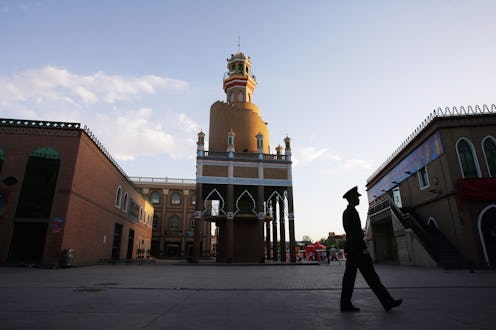News
A 'Terrorist Attack' You Didn't Hear About
The deadly explosions in Volgograd, Russia weren't the only apparent terrorist attacks that occurred this weekend. On Monday, Chinese police shot and killed eight people in the volatile region of Xinjiang, near the historic city of Kashgar. The government defended the shooting as a necessary action against a terrorist attack. The region is home to large number of Uyghurs, a mainly Muslim Chinese minority group, and deadly clashes between residents and police have claimed more than 91 people since April.
Labeled a "violent terrorist attack," a southern Chinese government website reported:
"At around 6:30 a.m., nine thugs carrying knives attacked a police station in Kashgar's Yarkand county, throwing explosive devices and setting police cars on fire. The police took decisive measures, shooting dead eight and capturing one."
Tensions in the region have been high since a Uyghur family reportedly set themselves on fire after driving a car into Tiananmen Square in October. In the past two months, at least 25 Xinjiang residents and policemen were killed in riots. During one particularly violent incident, a group of Uyghurs attacked a police station with axes and knives.
The Chinese government has a vested interest in the oil-rich region, which bears more of a resemblance to its neighbors to the west, Tajikistan and Kyrgyzstan, than to the bustling China of the east. But, in recent years, Chinese officials have tried to change that. Police have invaded Koran prayer gatherings and launched a "Project Beauty" movement against wearing veils, according to the World Uyghur Congress.
The traditional Islamic city of Kashgar is being demolished because the Chinese government says it is too dangerous if an earthquake strikes. About 13,000 Uyghur families are slated to be relocated to high-rise housing units in the city, which sits on the historic Silk Road. During the course of 10 years, the population went from being nearly all Uyghur to one-third Han Chinese, probably because of its attractive oil resources, according to the BBC. Since the government began investing in the region in 2010, centuries-old markets and mud brick houses have given way to shopping plazas and apartment buildings. The Chinese government also mandates that individuals cannot travel to Mecca alone, but must participate in state-run trips to the Muslim holy city.
But Xinjiang Uyghurs say they aren't benefiting from the rapid development, says Dilxat Raxit, spokesman for the World Uyghur Congress:
"Directly firing on and killing protesters and accusing them of so-called terror is currently China's post-judicial reform means of repressing the Uighur people. Uighurs endure China's discrimination and humiliation and are facing a crisis for survival and faith."
